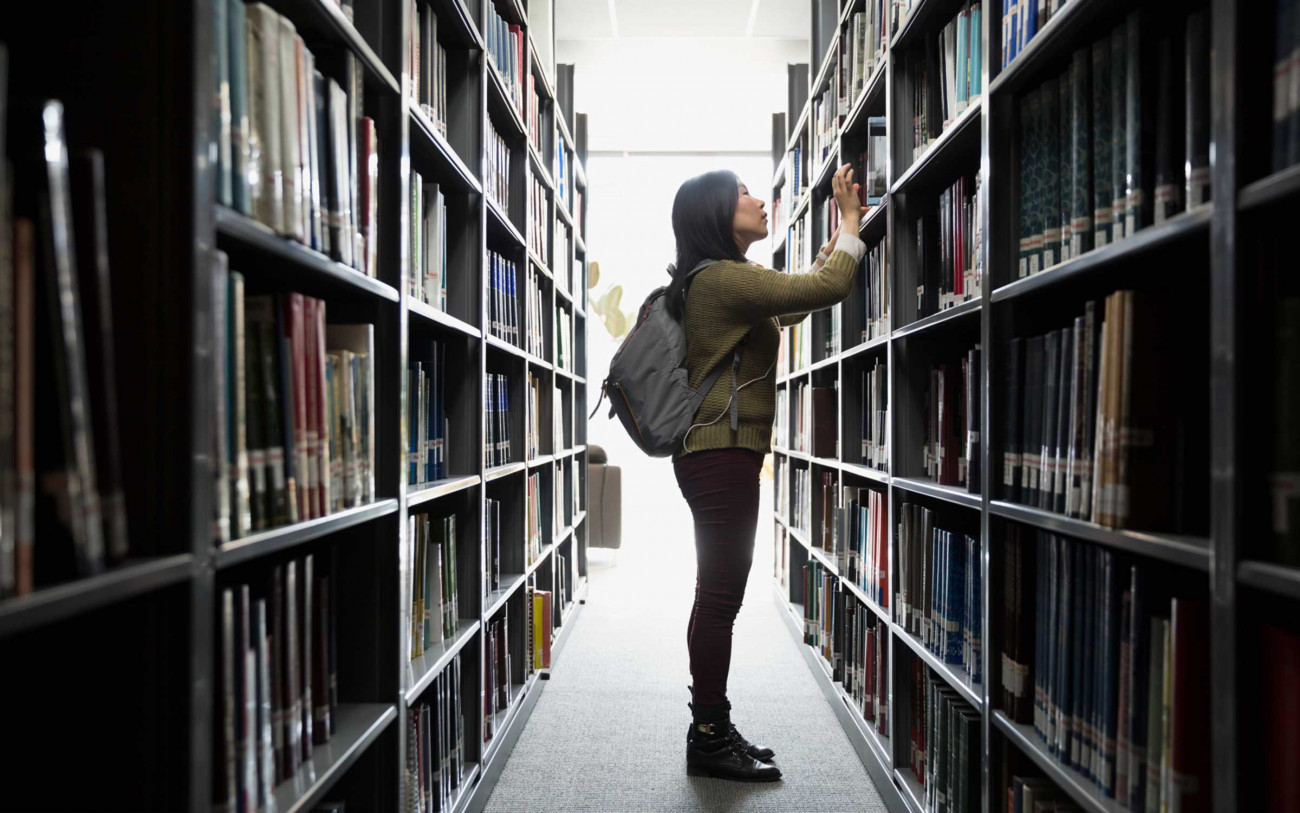Library Staff & Policies
COLLECTIONS & RESOURCES

The library offers access to a collection of print and electronic resources across various disciplines to support learning, teaching, and research at Ambrose.
AMBROSE ARCHIVES
In addition to historical records of Ambrose University and its predecessors, the archives currently houses records for The Alliance Canada and the Church of the Nazarene Canada.
Library Staff
Ambrose Library staff are happy to help with library and research questions. Feel free to stop by during business hours or send us an email!

Patricia Neufeldt
University
Librarian
patty.neufeldt@ambrose.edu

Kim Kissack
Public Services
Librarian
kim.kissack@ambrose.edu
Library Policies
To ensure that the library articulates as clearly as possible its mission vis-à-vis the development of its collections and that it fulfills that mission as efficiently as possible.
B. Scope
This policy applies to the library’s physical and electronic collections and encompasses both selection and de-selection.
C. Policy Details
Mission Statement
The goal of the Ambrose Library is to acquire, organize, preserve, interpret, and provide access to information resources that support the educational and research programs of Ambrose University and to assist Ambrose in fulfilling its mission and objectives. The Ambrose Archives, which is administered by the library, serves as the official repository for the institutional records of Ambrose University and its predecessors, the Christian and Missionary Alliance in Canada (CMAC), and the Church of the Nazarene Canada (cf. Ambrose Archives Mandate Statement).
Relationship of Mission Statement to Library Objectives
The Ambrose Library has as its primary clientele the students, faculty, and staff of Ambrose University and Ambrose Seminary. Secondary clientele include the students and faculty of those institutions with which the library has concluded reciprocal borrowing agreements or service contracts, consortia to which the library belongs, and the ministerial staff of local CMAC and Nazarene churches. To a lesser degree, the library also seeks to serve the general populace of the Calgary area.
To meet the educational and research needs of its primary clientele, the library acquires and organizes print, media and electronic resources; provides instruction and assistance in finding and using library materials; and promotes the development of consortia for the collaborative use of library resources. The Collection Development Policy sets forth guidelines for the development of on-site and virtual collections that will support the mission of Ambrose University.
Selection Criteria
The following criteria will be kept in mind when considering any work for inclusion in the collection:
- Relevance to a current course offering or to a faculty member’s field of research
- Reputation of the author or publisher
- Accuracy and currency of factual content and cogency of argumentation
- Value as a historical record
- Physical condition, if non-electronic
The availability of library materials in nearby libraries will be a major consideration in ordering infrequently-used non-digital works.
Statement on Academic Freedom
The Library is the main information resource for the educational needs of the students and faculty of Ambrose University. Therefore, its collection consists of materials reflecting a variety of perspectives, both Christian and secular. Although some materials may not reflect the viewpoints and commitments of Ambrose University, they are nevertheless included in order to foster an understanding of other perspectives and to provide the alternative vantage points necessary for the development of critical thinking and research.
Non-English Materials
Works in languages other than English are purchased if they are needed in connection with the classes given at Ambrose University, or if they provide information unavailable in English language sources.
Multiple Copies
The Library will normally purchase only one copy of a given work. The number of copies may be increased at the discretion of the University Librarian.
Paperbacks
Given the choice of buying a cloth or a trade paperback edition of the same work, the Library will, for the sake of economy, acquire the paperback edition.
E-books
The library will seek to purchase perpetual access to the electronic versions of required readings for online courses. The library will also acquire subscriptions to omnibus collections of e-books to provide retrospective collection support for those subject areas for which the library’s print holdings are currently weak. In the event that a paper volume to be ordered is duplicated in an omnibus collection, the library will nevertheless order the paper volume (given the relative instability of omnibus e-book collections).
Microforms
The microform edition of a given work is purchased only when it is unavailable in any other format.
Donations
It is the policy of the Library not only to purchase such materials as may be useful in fulfilling the objectives of Ambrose University and Ambrose Seminary, but also to encourage gifts of materials to the same end. Contributed materials are subject to the same standards of acceptance as those purchased.
Donations that do not conform to the Library’s selection criteria are either returned to the donor at the donor’s request and expense, or sold, donated, exchanged, or discarded at the discretion of the University Librarian.
Periodicals
Preference in selection will be given to those periodicals for which electronic full-text versions and comprehensive indexes are available. However, if a program head determines that an electronic aggregator’s embargo period is unacceptably long, then the library will also acquire paper edition of the journal in question. Likewise, the library will also acquire paper subscriptions to essential journals that are available only in that format.
In addition to those periodicals required for the educational and research needs of its primary clientele, the Library also subscribes to a limited number of magazines for leisure reading.
The Process of Selection
The University Librarian will constantly scrutinize the collection so as to discover those areas that need strengthening and to ensure that the collection develops according to the needs of the curriculum. The University Librarian also coordinates the selection process and collaborates closely with teaching faculty in the development of the collection. The final responsibility and authority for the development of the collection resides with the University Librarian. Departmental acquisitions budgets that remain unexpended or unencumbered by the agreed upon deadline (normally two months before the end of the fiscal year) will be spent at the discretion of the University Librarian.
Deselection
From time to time, the University Librarian will, in collaboration with the faculty, deselect from the collection materials that no longer conform to the selection criteria set forth in the collection development policy. The University Librarian will have the final say as to which items will be removed from the collection. Weeded items will be sold, given away, or discarded at the discretion of the University Librarian.
Budgetary Constraints
The purchase of library materials is limited by the approved annual budget. In the event that the cost of requests will likely run significantly beyond the funds available, the University Librarian will order only those items that are urgently required and will delay all remaining orders until funds become available.
Collection Support of New or Enhanced Programs
A library impact statement (to be submitted to the appropriate dean and Curriculum Committee) will be required as part of the approval process for all proposed academic programs, or proposed enhancements to existing programs and courses. The originator of the program or course proposal will develop the statement with the University Librarian and discuss with the dean so as to determine whether the proposed funding for the program will adequately cover the costs of the necessary library resources.
Interlibrary Loan
The Library supplements its collection through interlibrary loan (ILL) but it will not use ILL to supply reserve, recommended, or core materials. Interlending is not to be regarded as an alternative to solid collection development in support of the curriculum, but rather as a means of expanding access to materials that lie outside the scope of what the library would reasonably be expected to hold. The chief function of ILL is to provide bibliographic items for specialized research.
Special Collection
The Special Collection has been established to provide an exhaustive collection of published materials relevant to the study of the history and thought of the Christian and Missionary Alliance, and to provide a secure repository for rare or endangered library materials. Selection criteria:
- All publications bearing an Alliance imprint, regardless of language or material type, with the exception of Sunday school materials and those deemed to have no connection to the history or thought of the C&MA.
- Theses on the C&MA, with the exception of D.Min. projects dealing with individual Alliance churches in the United States
- All publications that treat the history or thought of the C&MA in some significant way.
- All publications relevant to the fourfold Gospel by authors closely associated with the Alliance.
- All works known to have exerted a formative influence on A. B. Simpson.
- Selected works by contemporaries of A. B. Simpson.
- Any materials lying beyond the scope of the above guidelines which in the opinion of the University Librarian are germane to the study of Alliance history and thought.
- Any library materials that, in the opinion of the University Librarian, require such a degree of physical protection as to make it inadvisable to permit patrons to have unrestricted access to them.
The University Librarian will normally make every reasonable attempt to acquire a duplicate copy for the circulating collection of all items in the Special Collection.
Archives
As was noted above, the Ambrose Archives is the official repository for the institutional records of Ambrose University (and its predecessors), the CMAC and the Church of the Nazarene Canada. The Archives also collects the papers of prominent individuals or organizations associated with the Christian and Missionary Alliance and with the CMAC in particular (cf. Ambrose Archives Mandate Statement).
- Valid government-issued photo ID is required in order to create and renew your account.
Privileges
- While onsite, access to:
- Library space and collections during open hours
- Electronic resources over free Wi-Fi (with personal device only)
- Offsite online access to:
- Library’s catalogue accessible through the library's website
- Library account for renewing books (with email address)
- May borrow up to 15 books at a time for a 2-week loan
- Books can be renewed for a maximum of 8 weeks if there are no holds on them
- You will receive a Due Date Notification email if your loan period is shortened due to a hold request
- The library sends automated courtesy notices 2 days before books are due and on the due date
- May request up to 5 books through interlibrary loan (ILL) each month
- There is a $10 service fee for each request on top of any charges from the lending library
Responsibilities
- Provides government-issued picture ID at the time of account registration and renewal
- Must have an active email address for receiving automated due date reminders and to renew books online
- Agrees that their library card is not transferable to others, and that borrowed books are never loaned to others
- Knows due date and renews or returns books on time in good condition
- Online renewals will be blocked if account is expired, overdue fines reach $25, maximum loan period has been reached (8 weeks), or item has been requested by an Ambrose patron
- Notifies the Library (by email or phone) if not receiving courtesy notices
- Agrees to fees and fines as outlined below:
Library Card Replacement Card Overdue Fines Recalled Overdue Fines Lost/Damaged Books $5 $5 $0.25/book/day $5/book/day Replacement cost of book + $15 Lost Book Process Fee
Limitations
- Cannot place hold requests, cannot check out Course Reserves, Education Collection, DVDs, CDs, LPs
- If books are needed for longer than 8 weeks, they must be returned and signed out again to restart loan period
- Overdue fines will not be waived; borrowing is blocked when fines reach $25
- Account is active for 1 year but can be renewed yearly in person provided there are no fines on the account
Failure to comply with policies will be considered grounds for revoking Community Borrower account.
- While onsite, access to:
- Library space and collections during open hours
- Electronic resources over free Wi-Fi (with personal device only)
- Offsite online access to:
- Library’s catalogue accessible through the library's website
- Library account for renewing books and requesting available books
- ATLAS for Alumni (full-text portion of the ATLA Religion Database)
- May borrow up to 30 books at a time for a 2-week loan
- Books can be renewed for a maximum of 8 weeks if there are no holds on them
- You will receive a Due Date Notification email if your loan period is shortened due to a hold request
- The library sends automated courtesy notices 2 days before books are due and on the due date
- May request up to 5 books through interlibrary loan (ILL) each month
- This is a free service; however, we do charge you any fees the lending library charges us
Responsibilities
- Must have an active email address for receiving automated due date reminders and to renew books online
- Agrees that their library card is not transferable to others, and that borrowed books are never loaned to others
- Knows due date and renews or returns books on time in good condition
- Online renewals will be blocked if account is expired, overdue fines reach $25, maximum loan period has been reached (8 weeks), or item has been requested by an Ambrose patron
- Notifies the Library if not receiving courtesy notices
- Agrees to fees and fines as outlined below:
Library Card Replacement Card Overdue Fines Recalled Overdue Fines Lost/Damaged Books Free! $5 $0.25/book/day $5/book/day Replacement cost of book + $15 Lost Book Process Fee
Limitations
- Cannot check out Course Reserves, Education Kits
- If books are needed for longer than 8 weeks, they must be returned and signed out again to restart loan period
- Overdue fines will not be waived; borrowing is blocked when fines reach $25
- Account is active for 1 year but can be renewed yearly in person provided there are no fines on the account
Failure to comply with policies will be considered grounds for revoking Alumni Borrower account.

